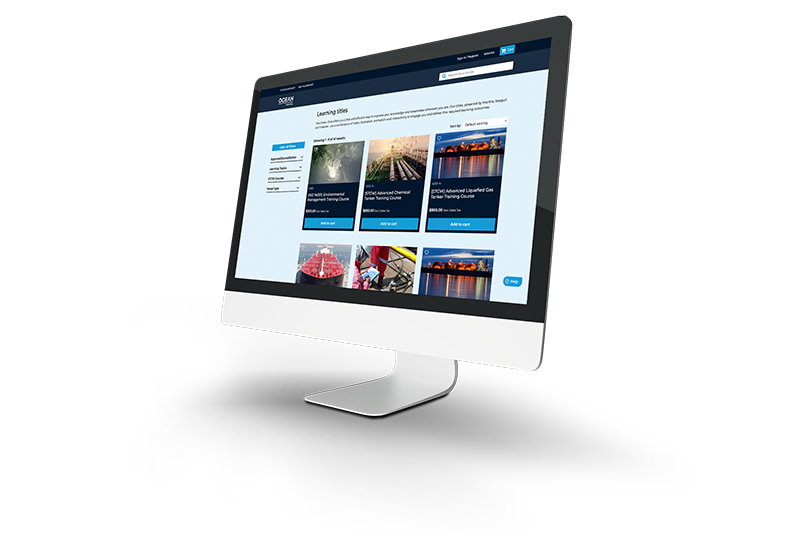Posidonia 2022
After four years away, Posidonia returned in 2022 and saw more people walk through its doors than any of its previous editions. Those that wound their way through hall 2 to join our Wednesday seminar, were treated to presentations and an impassioned debate around a core theme: people.
From discussions on the current recruitment landscape, ruminations on what needs to be done to attract and upskill the talent we need to keep our vessels moving tomorrow and be fit as we transition into a future of new technology and fuels, and ways of evidencing excellence in frameworks such as ESG, through to discussions on how to ensure that however we proceed, we do so in a way that is equitable and just for the people that power world trade – our seafarers.
It is clear from that intro alone, there was a lot to unpack over the session, so it was no surprise that it sparked lively debate and saw conversations continue over post-event coffee. You can read a roundup of some key talking points covered in the seminar below.
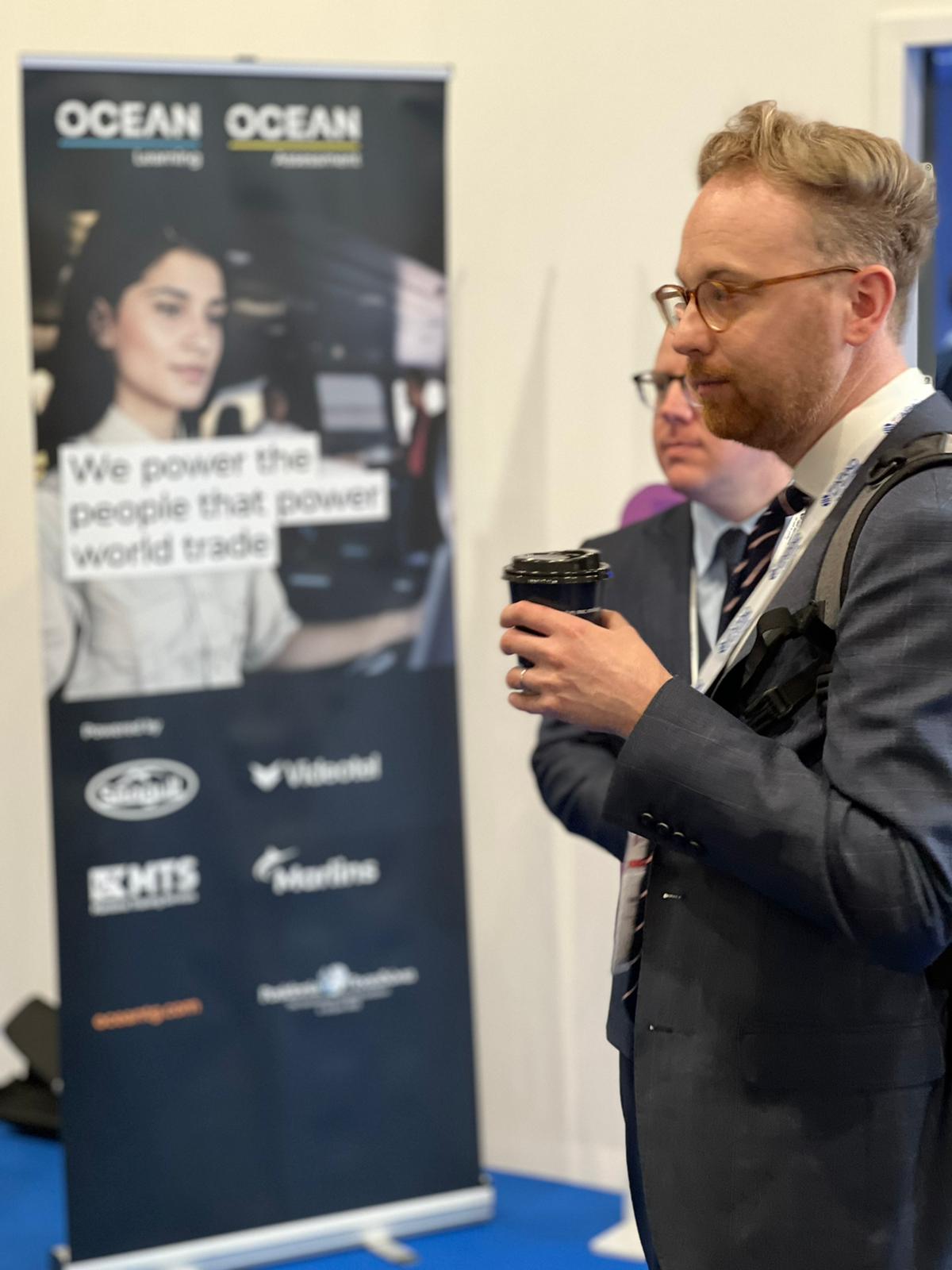
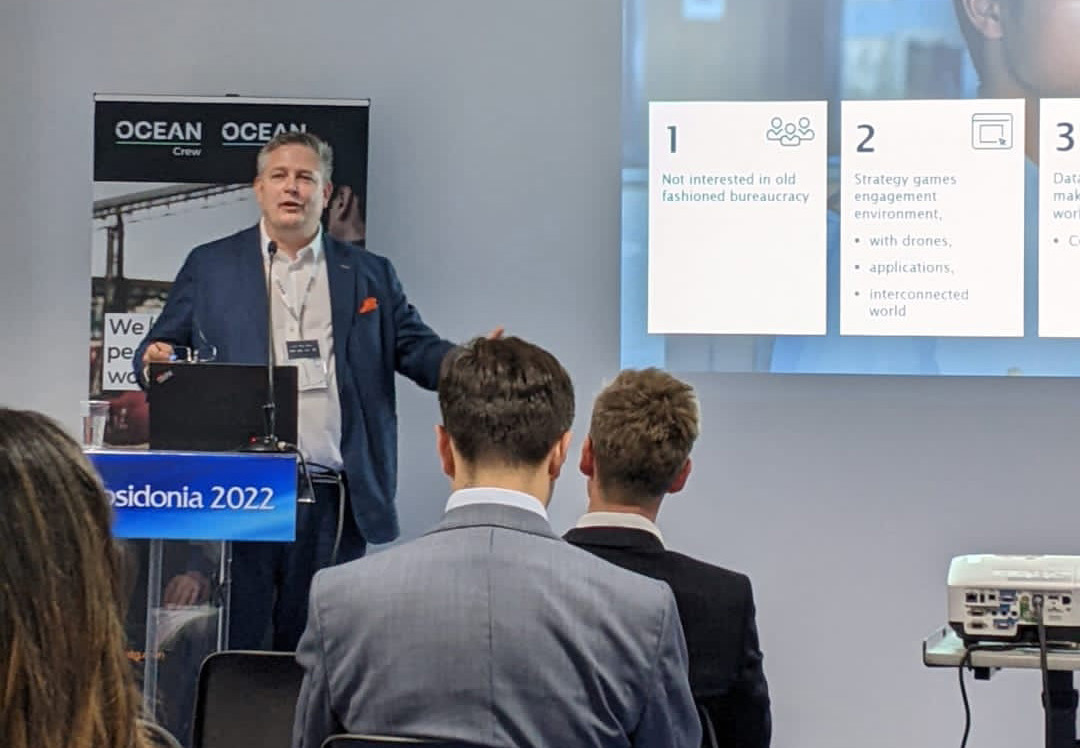
Johan Gustafsson
Chief Revenue Officer, OTG
Johan Gustafsson
After some broad scene-setting, our CRO, Johan Gustafsson, outlined what he saw as the challenges and opportunities in front of us and what habits we need to break to move forward. He called for companies to adjust their thinking, to move on from old-fashioned procedures and business models, from doing things just because they have always been done that way, away from complicated multi-system connections with APIs, manual imports and exports, and manual input of the same data into three or four different systems, and to embrace the opportunities and benefits technology and new ways of working offer.
He called for commercial shipping to move towards a no-blame culture. He outlined that this, along with other measures, will be critical to make the working in maritime an attractive prospect to the younger generation, a need that is ever-more important as our sector finds itself competing in less-traditional talent markets.
Guy Platten, Secretary General ICS
Speaking about the massive opportunity presented by the 2050 decarbonisation goals, Guy Platten emphasised the importance of learning from the mistakes of the pandemic, as well as the way the industry came together, as we move forward into a future of new fuels.
To hit the 2050 decarbonisation targets will require new fuels and new technologies, something that is more commonly termed the ‘fourth propulsion revolution’. Not only will vessels need to change to operate on new fuels or a combination of fuels, but there will also need to be an infrastructure change to supply these vessels with the fuels they need. Shipping will be called on to transport these new fuels from where there are produced to where they are needed, and we will need the seafarers to man the ships moving these cargoes.
The treatment of seafarers during the pandemic, with some stranded at sea, unable to disembark for sometimes up to two years was not a strong advertisement for a life at sea. This, and other factors, are already having a tangible impact on the number of young people wanting to join our industry.
Our industry needs to do more to attract people to our industry and to retain the talent we have. The Just Transition Taskforce is committed to improving the working conditions, inclusivity and diversity in our industry and ensuring that everyone, from the global North and from the global South, benefits from decarbonisation.
Guy sees this as shipping’s moment to show leadership, to build an inclusive, highly skilled, highly motivated workforce that is resilient to adaptable in the face of change.
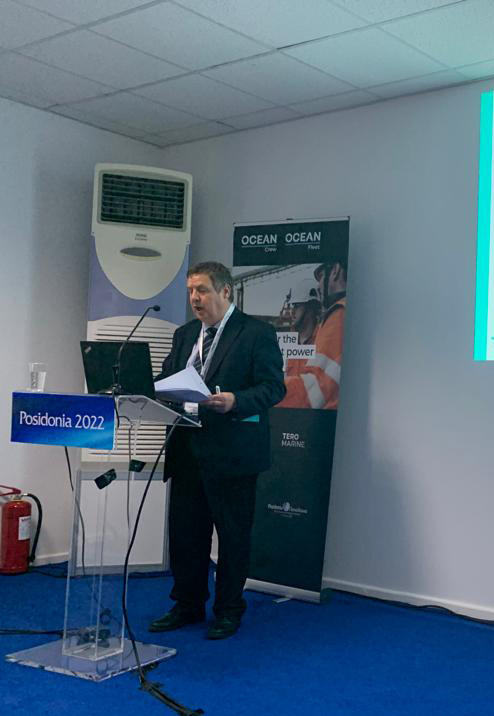
Guy Platten
Secretary General ICS
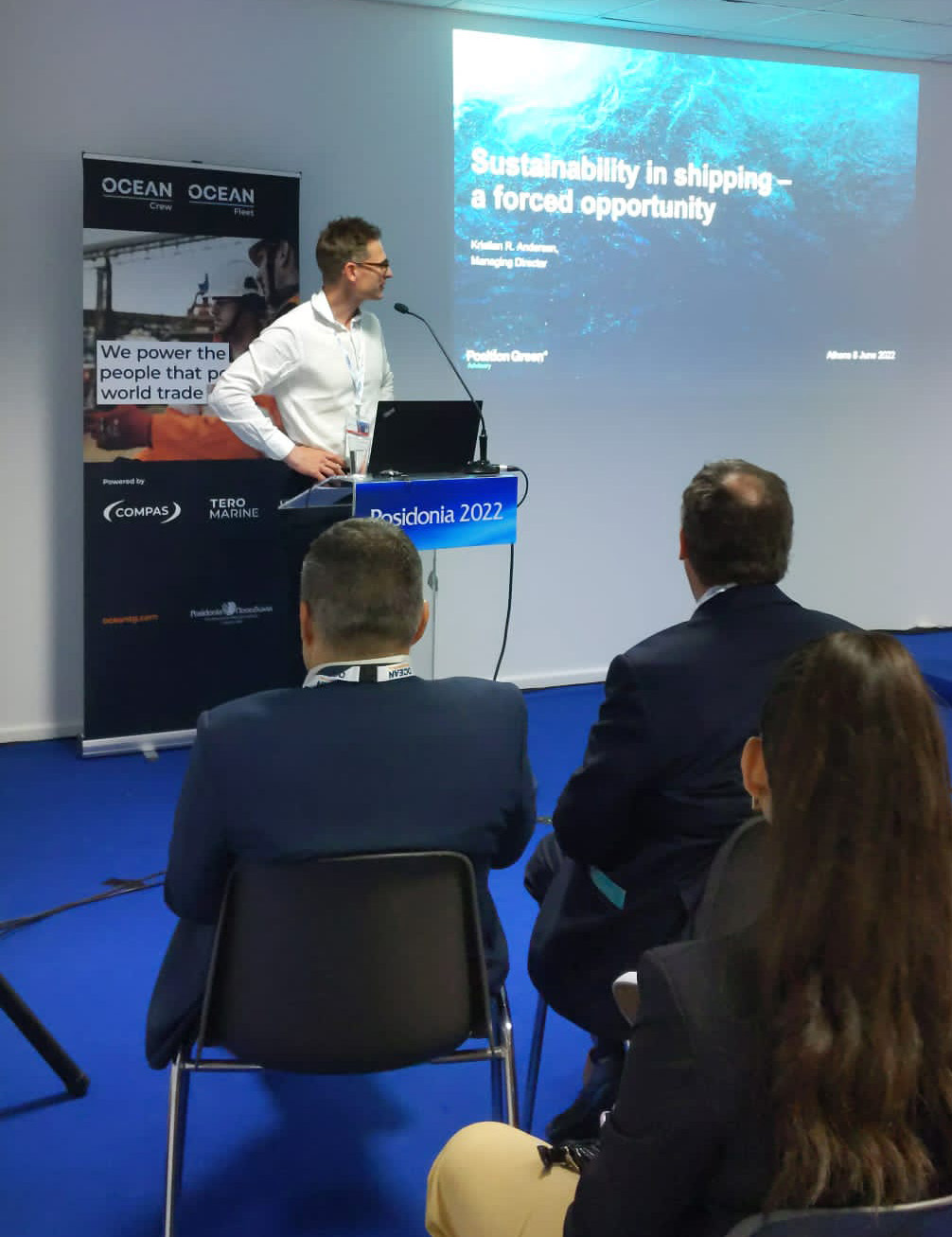
Kristian R Andersen
Position Green Advisory
Kristian R Andersen, Position Green Advisory
Shifting tack slightly, but still with a sustainable future front and centre, Kristian picked up the batten to give us a taste of the role ESG will play in shaping shipping as we move forward.
Building out his story around what he termed ‘forced opportunity’, where external pressure for increased transparency and working to sustainability frameworks will bring huge benefits to our industry, Kristian first clarified the differences and overlap of ESG and sustainability.
In short, ESG is primarily concerned with data, in that it is the metrics by which you are judging your operations or the metrics by which external agencies are judging you.
Sustainability, however, is looking at how those ESG metrics are managed and effected in a way that ensures your business is sustainable. Kristen was quick to point out that ‘sustainable’ does not only mean environmentally sustainable, but sustainable in terms of longevity of a business – is the business operating in a way which will ensure that it continues to operate many years into the future?
Looking at the links between ESG and access to finance or capital, analysts are already judging companies by a set of predefined public and proprietary set of metrics when making investment decisions. Banks, as well as large charters such as Amazon and Ikea, are looking at what companies are putting into the public domain both in terms of commitments to ESG initiatives and the data they publish, to identify where best to invest their capital or place their business with.
Raal Harris
Ahead of the panel discussion, Raal Harris championed technology as a tool for simplifying communication and interactions. Moreover, he stated that technology should be an enabler of change and efficiency, it shouldn’t just be another list of jobs to do.
Echoing the words of those who came before him, Raal reiterated his belief that people will be key to overcoming the challenges our industry faces now and in the future. Finding the right people with the right skills and culture fit and building teams that are resilient is more critical now than ever.
He described how Ocean Learning Platform, COMPAS Crew Management and TM Master fleet management tools can not only enable onboard and shore based teams, but can also provide vital data points that can help manage KPIs and enable reporting. His parting message was that many of the things operators are already doing and many of the tools they already have can be utilised to build a positive ESG story.
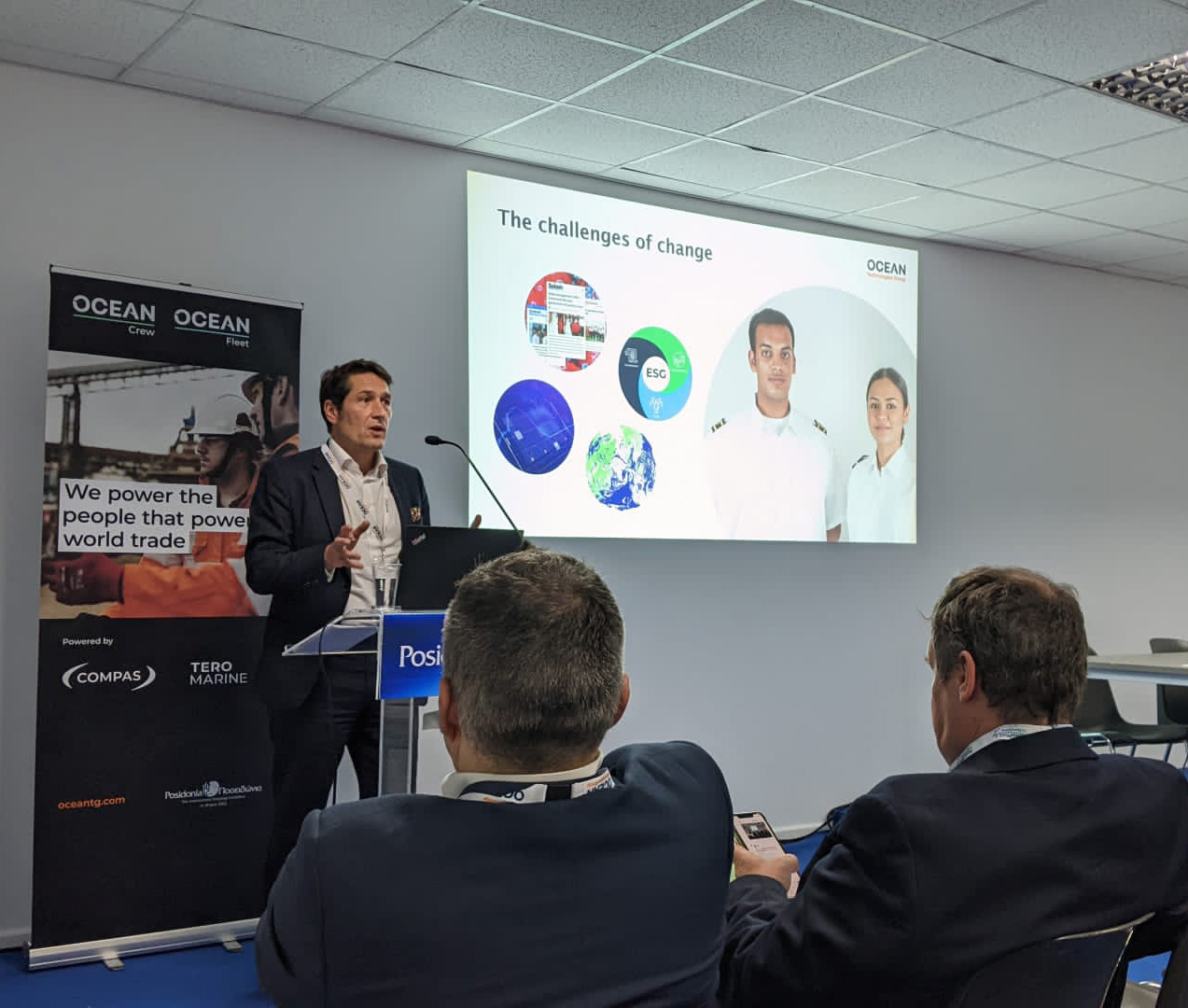
Raal Harris
Chief Creative Officer, OTG
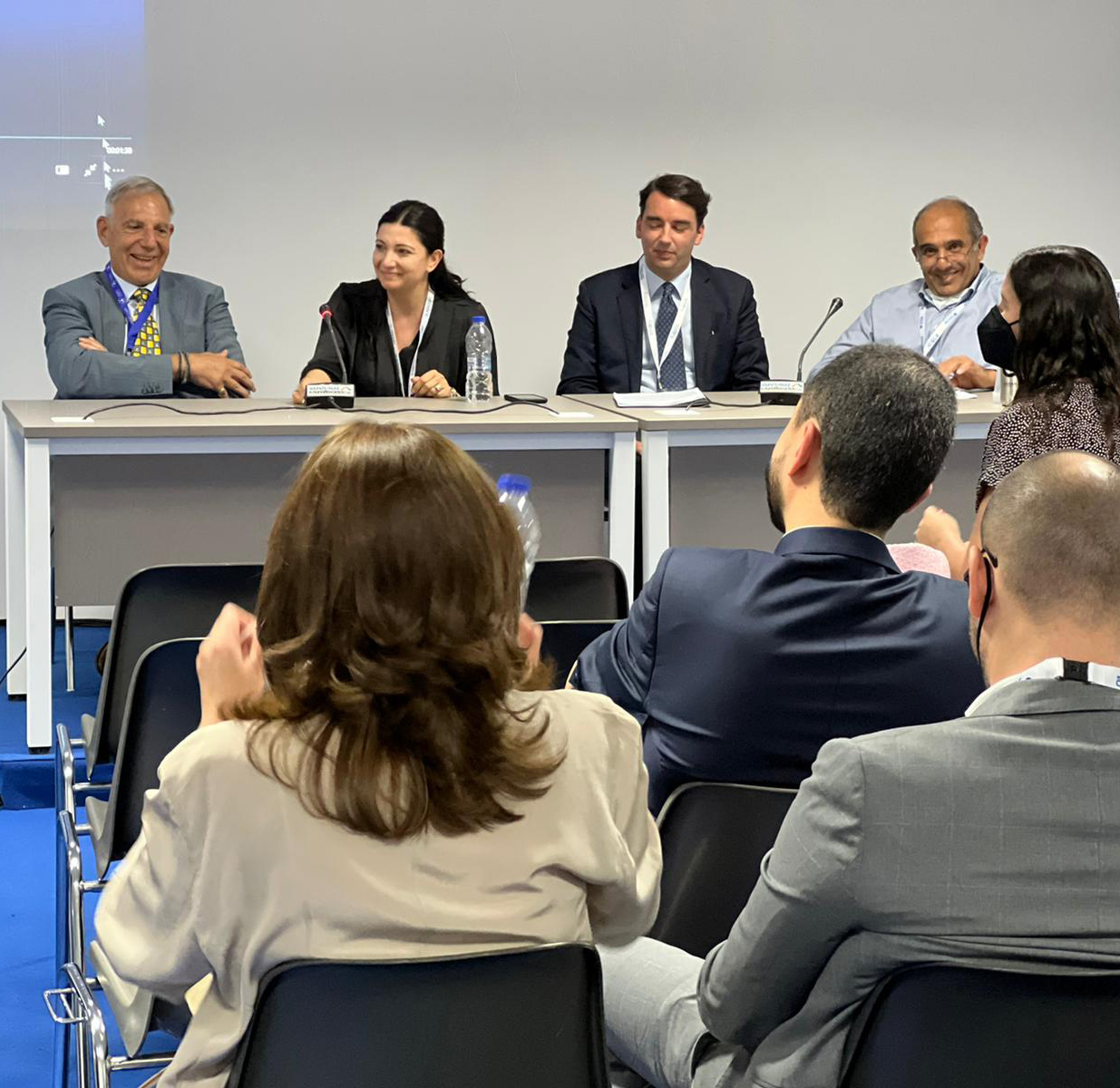
Panel
Moving on to the panel discussion, Raal welcomed Julia Anastasiou of OSM Maritime Group, Dimitrios Fokas of Angelcoussis Group, Dmitris Harbis of MTM Maritime Group and George Gabriel of Golden Union Shipping to join him on stage.
This panel was diverse, yet their voices were in perfect harmony. Each panellist, from their opening remarks to their closing statements, emphasised the importance of company culture and the need for continual communication of values through every level of an organisation.
Much of the conversation centred on the challenge of retaining and attracting the talent needed to crew vessels today, and how to make the shipping industry attractive again. Once again, culture was seen as one of the most crucial elements of attracting, retaining, and motivating the seafarers of tomorrow. With the next generation putting higher weight on company values and working environment, sometimes ahead of financial compensation.
Throughout this invaluable and, oftentimes, brutally honest discussion, each question or comment was always anchored to calls for building inclusive company culture and creating an environment that will protect our seafarers of today and attract our seafarers of tomorrow.
Summary
In summing up, Raal reiterated that to achieve the goals the industry has set itself, we need to equip our people with the technology, skills and time they need to grow and adapt to a future of technology, ships and ways of working that are still largely unknown. Resilience and adaptability must be hard-baked into company culture, with leaders getting in front of their teams as much as possible, and technology makes that more possible than ever before.
You already have so many powerful tools at your disposal, from e-learning and cloud simulation, through to online assessments for competence and personality, as well as tools for communicating with widely dispersed teams, such as virtual classrooms and rapid authoring tools.
Thank you to everyone who attended, and a very extra special thank you to each of our guest speakers and panellists.
Guy Platten, Secretary General, ICS
Kristian R Andersen, Position Green Advisory
Julia Anastasiou, Deputy Managing Director, OSM Maritime Group
Dimitrios Fokas, Training Manager, Maran Tankers Management
Dmitris Harbis Director – Global Business Development, MTM Maritime Group
George Gabriel, Director, Golden Union Shipping Co. S.A.


Choose from a wide range of courses that cover your compliance and conformance needs, along with non-mandatory safety, security, and professional development topics.
